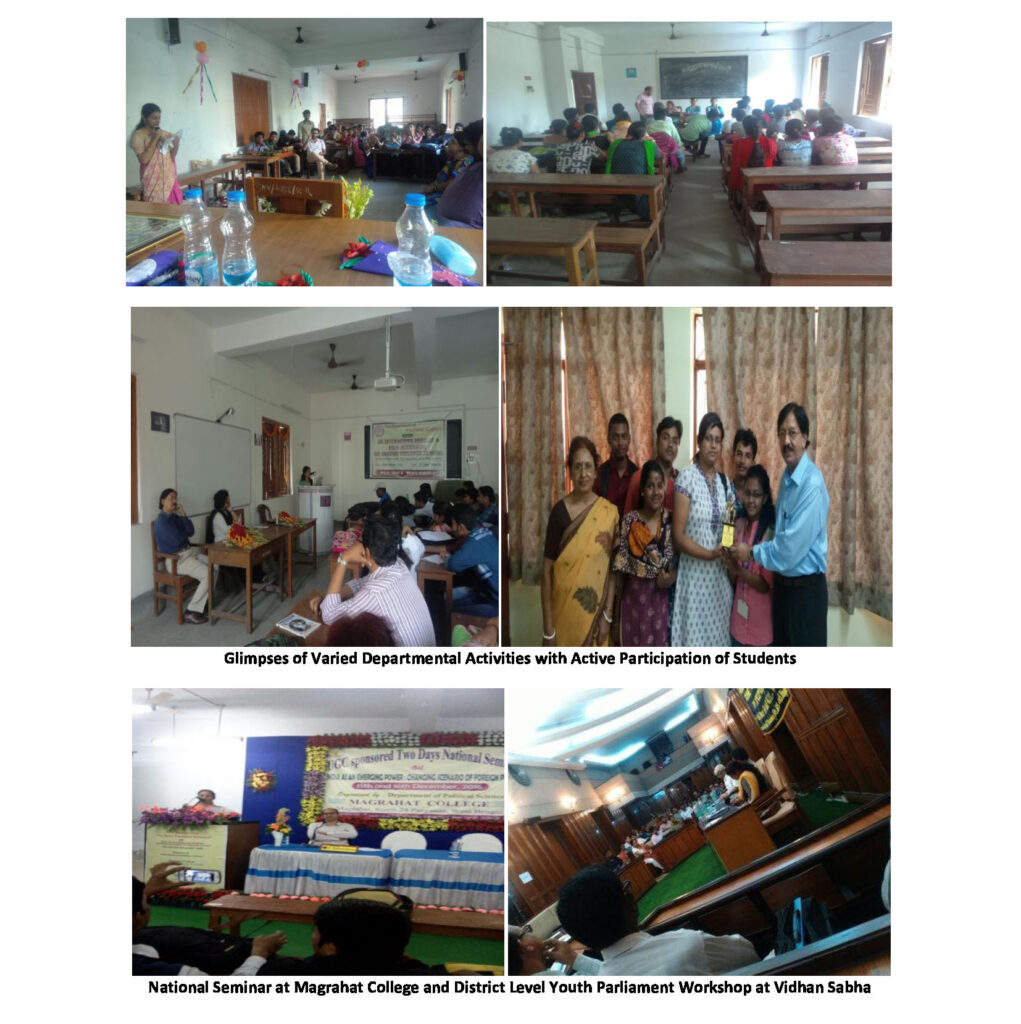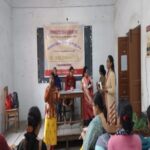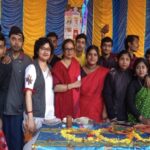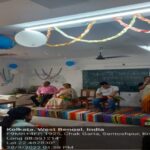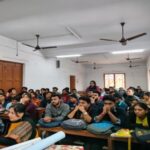- About the Department
- Faculty Profile
- Courses Offered
- PO and CO
- Certificate / Add-on courses
- Teaching-learning
- Result and Student Progression
- Departmental Activities and Achievements
- Collaborative activities under MoU
- Alumni
- Photo Gallery
Vision and Mission
The Department had emphasised upon
- quality education with academic excellence so that there can be
- holistic development of admitted students mainly coming from different areas of South 24 Parganas also representing socially, educationally and economically backward castes and classes since its inception. It always aimed that common mass are
- well informed and sensitised about their responsibility as denizens. The Department is also keen in
- providing exposure so that they can face the ordeal of placement and equip themselves to cope up with challenges of job market.
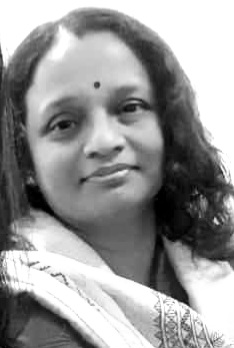
Smt. Lupsy Mohanty Roy,
Designation: Assistant Professor
Email: lupsy@rediffmail.com
Phone Number: 9830798534Get Detail »
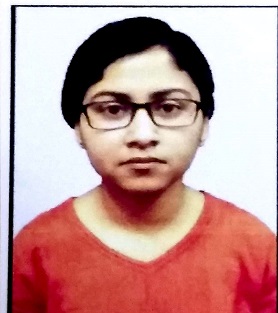
Dr. Sukanya Muhkerjee
Designation: State Aided College Teacher
Email: sukanya.kgp@gmail.com
Phone Number: 6294929088Get Detail »

Sri Debdutta Chakraborty
Designation: State Aided College Teacher
Email: debdutta09@gmail.com
Phone Number: 8820064006Get Detail »
Sri Rahul Sengupta*
Designation: State Aided College Teacher
Email: rahulrustic22@gmail.com
Phone Number: 8335813710Get Detail »
List of Core Course (CC) with its Outcome under CBCS
|
Semester I (Core Course) |
Course Outcome |
| CC1 – Understanding Political Theory: Concepts |
v Enrich the students with theoretical knowledge about concepts, theories of J.Rawls and David Held. v Strengthen the basic conceptual knowledge about the subject. |
| CC2 – Understanding Political Theory: Approaches and Debates | v Provide knowledge about various approaches in political science, theories, scientific socialism of Karl Marx, Lenin-Rosa debate, Hegemony and Civil Society of Gramsci |
|
Semester II (Core Course) |
Course Outcome |
| CC3- Constitutional Government in India | v Impart knowledge about Indian Constitution, evolution, salient features, amendment procedure and functioning of three branches of government. |
| CC4 – Politics in India: Structures and Processes | v Generate awareness among students about Indian Party System and various movements related to environment, human rights, women and impact of caste, religion and language on Indian Politics. |
|
Semester III (Core Course) |
Course Outcome |
| CC5- Indian Political Thought-I | v Provide knowledge on contribution made by various Indian Political Thinkers from Kautilya to Gandhi. |
| CC6- Comparative Government and Politics | v Provide knowledge on constitutions of various nations like UK, USA, PRC, Russia, France, Bangladesh and gain basic understanding about comparative politics and government. |
| CC7- Perspectives on International Relations | v Provide conceptual knowledge about International Relation, theories, Indian Foreign Policy, Indo-Us and Indo-Sino bilateral relations. |
|
Semester IV (Core Course) |
Course Outcome |
| CC8- Indian Political Thought-II | v Provides knowledge on thinkers from M.N.Roy to Pandita Ramabai |
| CC9- Global Politics since 1945 | v It deals with Cold War and Post Cold War Phase Politics, information about various regional organizations, UNO and bilateral relations with neighbouring countries. |
| CC10- Western Political Thought and Theory-I | v It deals with indelible contribution of western political thinkers from Greek till social contractualist like Rousseau. |
|
Semester V (Core Course) |
Course Outcome |
| CC11- Western Political Thought and Theory-II | v It deals with indelible contribution of western political thinkers from Bentham till Frankfurt School and Post Marxism contentions. |
| CC12- Political Sociology | v It basically deals with various concepts of social structure and impact of religion, gender on Indian politics and Electoral politics. |
|
Semester VI (Core Course) |
Course Outcome |
| CC13- Public Administration—Concepts and Perspectives | v It deals with basic understanding about public administration, public policy and its major concepts |
| CC14- Administrative and Public Policy in India | v It focuses mainly on civil service, Panchayati Raj, social welfare policies like MGNREGA, NHM, SSA, 73rd and 74th Amendment Act. |
Apart from the above CC in Advance Course there are CC paper for General/Pass students as well as DSE and SEC papers too for specialization.
Courses offered under CCF 2022
The Department of Political Science follows the syllabus prescribed by the affiliating University of Calcutta. Previously our department followed 1+1+1 system till 2018 from then onwards Choice Based Credit System (CBCS) was implemented. The first batch of Semester system passed in the year 2021. The Curriculum and Credit Framework (CCF) 2022 came into effect from academic session 2023-24 which was implemented by the University of Calcutta in accordance with New Education Policy (NEP), 2020. The details of Course Offered with Subject Code, Duration and Total Credits is given below:-
| Courses Offered | Course Code | Duration | Examination System | Total Credits with Marks |
|
B.A. Honours in Political Science (with/without research) |
PLSM | 4 years | Semester |
22X100 = 2200(DSC/CC) 8X 100 = 800(Minor) 3X 75 = 225(IDC/MDC) 4 x 50 = 200(AEC) 3 x100 = 300(SEC) 4 x50 = 200(CVAC) 1x 75 = 75 (Summer Internship) 3x 100 = 300* Total Marks = 4300 |
|
B.A Multidisciplinary (MDC) |
MPLS | 3 years | Semester |
8 x 100 = 800(CC1) 8 x 100 = 800(CC2) 6 x 100 = 600(Minor) 3 x 75 = 225(IDC) 4x 50 = 200(AEC) 3 x 100 = 300(SEC) 4 x 50 = 200(CVAC) 1x 75 = 75 (Summer Internship) Total Marks = 3200 |
1 credit is equal to 25 marks
*Candidates who will not pursue Dissertation/Research work then he/she will have to study additional 1 DSC/Core paper of 4 credits in the 7th Semester & 2 DSC/Core Papers of 4 Credits each in the 8th Semester.
Programme Outcome for Political Science Major 4 year Degree Course and 3 year degree Multi Disciplinary Course
B.A Political Science Major (PLSM)
- Students scoring CGPA equivalent to 75% after successful completion of all the first 6 semesters (3years) may opt for Honours with research Degree Course in the 7th & 8th Semester.
- Students choosing a 4year Bachelors Degree (single major with research course) undertake research projects under the supervision of a faculty member.
- It’s the basic conceptual clarity about the discipline that helps to explore other social sciences and feasible areas of interdisciplinary research.
- Students can pursue legal studies/law or journalism in future as the course provide knowledge on laws, rights etc.
- Students can go into teaching, bureaucracy, banking sector, social work etc.
- Knowledge imparted about Constitution of India—its values and fundamental duties can make better parliamentarians/ legislators/ administrators.
- The amalgamation of theoretical knowledge and research methodology helps to enhance their skills for further research and exploration.
- Last but not the least students pursuing degree course in political science major will become wary, sensitive and conscious denizens.
Syllabus and Course Outcome
The affiliating University ensures that new areas are incorporated within the imparted courses and the ongoing Semester wise Four Year B.A (Honours & Honours with Research) course has Skill Enhancement Course (SEC) related to Legal Literacy, Legislative Procedures Research Methodology etc as well as Discipline Specific Core Course/ Core Course (DSCC/CC) associated with Governance and Public Policy, Gender Studies, Global Politics, Human Rights etc. It has opened up novel avenues for employment in the field of law, journalism, governance etc. and also encourages students to explore research areas through getting enrolled and pursuing degree course with research for probe further.
List of Discipline Specific Core Course/ Core Course (DSCC/CC) in Political Science Honours with its Outcome
| Semester I (Core Course) | Course Outcome |
| CC1 – Political Theory: Foundational Concepts |
v Enrich the students with theoretical understanding about concepts, theories of J.Rawls and David Held. v Enhance the basic conceptual knowledge related Power, Authority, Liberty, Equality, Citizenship, Political Obligation etc. |
| SEC 1 – Democratic Awareness with Legal Literacy | v It deals with legal system, IPC, CPC, FIR, laws to cease violence against women, cybercrimes, consumer rights etc. |
| Semester II (Core Course) | Course Outcome |
| CC2 – Constitutional Government in India | v Impart knowledge about Indian Constitution, its evolution, salient features, amendment procedure and functioning of three organs of government. |
| SEC 2- Understanding the Legal System | v Basically deals with Judicial Activism, PIL, Administrative Tribunal, Lok Adalats, Anti Defection Law, Mahila Court etc. |
| Semester III (Core Course) | Course Outcome |
| CC 3- Political Theory : Approaches and Debates | v Provide knowledge about various approaches in political science, theories, scientific socialism of Karl Marx, Lenin-Rosa debate, Hegemony and Civil Society of Gramsci |
| CC 4 – Politics in India: Structures | v Generate awareness among students and keep them informed about Indian Party System and its functions. |
| SEC 3- Legislative Practices and Procedures | v It deals with MPLAD, Privileges and Procedures of Parliament, local self government and legislative assemblies. |
| Semester IV (Core Course) | Course Outcome |
| CC5 – Politics in India: Processes | v Sensitize students about various movements related to environment, human rights, women and impact of caste, religion and language on Indian Politics. |
| CC6 – International Relations: Concepts, Theories | v Provide conceptual knowledge about International Relation, theories, contemporary issues and concepts. |
| CC7 – Public Administration—Concepts, Theories | v It deals with basic understanding about public administration, theories and its major concepts. |
| CC 8 – Indian Political Thought-I | v Provide knowledge on contribution made by various Indian Political Thinkers from Kautilya to Gandhi. |
| Semester V (Core Course) | Course Outcome |
| CC 9 – Indian Political Thought-II | v Provides knowledge on thinkers from M.N.Roy to Pandita Ramabai |
| CC 10- Western Political Thought-I | v It deals with the indelible contribution of western political thinkers from Greek till social contractualist like Hobbes, Locke and Rousseau. |
| CC 11- Political Sociology | v It basically deals with various concepts of social structure and impact of religion, gender on Indian politics and Electoral politics. |
| CC 12- India and the World: Foreign Policies and Strategies | v It focuses on basic features of Indian Foreign Policy and relation with China, Russia, USA as well as India emerging as a South Asian Power. |
| Semester VI (Core Course) | Course Outcome |
| CC 13 – Western Political Thought -II | v It deals with indelible contribution of western political thinkers from Bentham till Frankfurt School and Post Marxism contentions. |
| CC 14 – Public Administration: Indian Context | v It focuses mainly on civil service, Panchayati Raj, social welfare policies like MGNREGA, NHM, SSA, 73rd and 74th Amendment Act. |
| CC 15- Comparative Government and Politics- I | v Comparative study about salient features of the Constitution of UK, USA, PRC, Bangladesh, France and Switzerland. Also will provide basic understanding about comparative politics and comparative government and the differences between two. |
| Semester VII ( Core Course) | Course Outcome |
| CC 16- Global Politics since 1945 | v It deals with Cold War and Post Cold War Phase Politics, information about various regional organizations, UNO and bilateral relations with neighbouring countries. |
| CC 17- Comparative Government and Politics- II | v Basically will deal with functioning of various organs of government of different countries with different kinds of political systems. |
| CC 18 – Governance and public policy in India | v Its a new paper with relevant contemporary issues related to good governance and public policy. |
| Non-Dissertation students only | |
| CC 19- Understanding Gandhi and Ambedkar | v It will provide basic understanding of Gandhism and philosophy of Dr. B.R. Ambedkar, the Father of our constitution. |
| Semester VIII (Core Course) | Course Outcome |
| CC 20- Research Methodology and Academic Writings: Basics | v It deals with tools and techniques of research , methods of data collection, ethics in research, bibliography etc. |
| CC 21- Human Rights : Theory and Indian Context | v It provides knowledge on UDHR, NHRC, SHRC, history of human rights and problems related to it. |
| CC 22- Gender and Politics | v It gives an understanding about sex-gender debate, patriarchy, women’s movement, violence against women etc. |
| CC 23- State Politics in India | v It is a new paper basically focussing on State Politics in different states of India |
| Non-Dissertation students only | |
| CC 24- Understanding South Asia | v It deals with South Asian Countries, bilateral relations among them. |
| CC 25- Understanding Political Economy | v It deals with Civil Society, Political Economy, Culture, Global Inequalities etc. |
Apart from the above CC in Major there are CC papers for MDC students as well as SEC, IDC and CVAC papers too for specialisation.
B.A Political Science Minor (MPLS)
- Students who obtain bachelors degree if interested in further studies then take admission in Masters Degree through distance education or by qualifying written entrance exam.
- The UG degree course helps them in gaining knowledge to prepare for competitive examinations and government jobs.
- The students also gain knowledge, basic understanding about law through legal literacy course.
- The knowledge gained helps to explore fields of social work and job prospects in NGOs.
- The knowledge gained through Constitutional Values as CVAC helps in preparing for competitive examinations, comprehend the fundamental law of land.
- Last but not the least students become better human beings and responsible citizens.
List of General Core Course (CC)/Generic Elective (GE) with its Outcome
|
Semester I (Core Course) |
Course Outcome |
| CC 1- Political Theory: Foundational Concepts | v Basically provides conceptual knowledge about the subject, denotation of terms like Democracy, Law, Liberty, Equality, Justice, Rights. |
| SEC 1 – Democratic Awareness with Legal Literacy | v It deals with legal system, IPC, CPC, FIR, laws to cease violence against women, cybercrimes, POTA, TADA, UDHR, RTI, Human Rights Act 1993, consumer rights etc. |
|
Semester II (Core Course) |
Course Outcome |
| CC 2- Constitutional Government in India | v Basically emphasises on constitutional structure with salient features of India. |
|
Semester III (Core Course) |
Course Outcome |
| CC 3 – India and the World: Foreign Policies & Strategies | v Basically deals with current affairs and Foreign Relations with Neighbouring Countries and Developed Nations, strategies and foreign policies. |
|
Semester IV (Core Course) |
Course Outcome |
| CC 4 – Public Administration: Indian Context | v It deals with Private Administration and New Public Administration, Development Administration, Comparative Public Administration, Public Policy, major programmes like MGNREGA, SSA, National Rural Health Mission etc. |
| CC 5 – Politics in India: Structures | v Generate awareness among students and keep them informed about structural framework, Indian Party System and its functions. |
|
Semester V (Core Course) |
Course Outcome |
| CC 6 – Politics in India: Processes | v Sensitize students about various movements related to environment, human rights, women and impact of caste, religion and language on Indian Politics. |
| CC 7 – Indian Political Thought I | v Provide knowledge on contribution made by various Indian Political Thinkers from Kautilya to Gandhi. |
|
Semester VI (Core Course) |
Course Outcome |
| CC 8 – Indian Political Thought II | v Provides knowledge on thinkers from M.N.Roy to Pandita Ramabai. |
Programme Outcome for Three Year Degree Political Science Honours and General Course
B.A Political Science Honours
- Students after attaining bachelors degree either continue with higher studies or try to secure a job.
- Students try to grasp the discipline conceptually and practically.
- There are students who have bachelor’s degree pursue other related fields to secure their future.
- The field of literature and writing is always there to be unfolded provided if the student has the skill and flair.
- Students can always go into teaching, bureaucracy or become better parliamentarians/ legislators/ administrators.
- Last but not the least students pursuing degree course in political science will become responsible, well informed and conscious denizens.
Syllabus and Course Outcome
The affiliating University ensures that new areas are incorporated within the imparted courses and the ongoing 1+1+1 system will be replaced by CBCS course which has Skill Enhancement Course (SEC) related to Legal Literacy, Research Methodology etc as well as Discipline Specific Elective Course (DSE) associated with Gender Studies, Global Politics, Human Rights etc. Students can explore the international arena by gaining knowledge about International Relation, theories, diplomacy so on and so forth. International Relation and Comparative Politics are the upcoming areas.
List of Honours Course with its Outcome
| Part I | Course Outcome |
| Paper I — Political Theory |
v Enrich the students with theoretical knowledge about concepts, theories of J.Rawls Bentham, J.S.Mill and David Held. v Enhance the basic conceptual knowledge about the discipline. v Provide knowledge about various approaches in political science, theories, scientific socialism of Karl Marx, Lenin-Rosa debate on party. |
| Paper II — Comparative politics and government |
v Difference between Comparative Government and Politics, scope, approaches towards study of comparative politics, federalism in US and Russia. v Comparison between UK, PRC, USA and France, their legislature, executive and judiciary. |
| Part II | Course Outcome |
| Paper III — Government and Politics in India |
v Impart knowledge about Indian Constitution, its evolution, salient features, amendment procedure and functioning of three organs of government. v Generate awareness among students and keep them informed about Indian Party System and various movements related to environment, human rights, women and impact of caste, religion and language on Indian Politics. |
| Paper IV– International Relations | v Provide conceptual knowledge about International Relation, theories, Indian Foreign Policy, contemporary issues like Indo-Us and Indo-Sino bilateral relations, UNO, regional organisations like ASEAN, OPEC, NAM, SAARC etc. |
| Part III | Course Outcome |
| Paper V– Western Political Thought |
v Provide knowledge about thinkers like Plato, Aristotle, medieval, Roman thinkers, social contractualists like Hobbes, Locke and Rousseau, Civil Society of Hegel, liberty of J.S.Mill. v Difference between Utopian and Scientific Socialism, Utilitarianism of Bentham. |
| Paper VI — Indian Political Thought and Movement | v Provide knowledge on contribution made by various Indian Political Thinkers from Kautilya to Gandhi, INA and S.C.Bose, Ambedkar on Depressed Class, Jinnah, Savarkar etc. |
| Paper VII — Political Sociology | v Provides knowledge on Social Stratification, Caste, Class, Power, Authority, Legitimacy, Gender and Politics, Political Participation, Political Socialization, Parties, Pressure Groups, Political Communication, Electoral Behaviour, Political Development and Social Change. |
| Paper VIII – Public Administration | v Gives knowledge about concepts of Public Administration, approaches, district administration, Local Self Government, Lokpal, Lokayukt etc. |
Apart from the above Honours Course there are papers for General/Pass students. Each of the papers carry 100 marks (4 units of 25 marks each i.e. 2 short notes of 5 mark each and 1 subjective question of 25 marks).
B.A Political Science General (PLSG)
- Students who obtain bachelors degree if interested in further studies then take admission in Masters Degree through distance education.
- The students also gain knowledge, basic understanding about the different papers in the course which help to prepare for competitive examinations and government jobs.
- The UG degree course helps them in gaining knowledge about topics incorporated in general knowledge or general studies.
- The knowledge gained helps to explore fields of social work, health and job prospects in NGOs.
List of General Course with its Outcome
| Part I | Course Outcome |
| Paper I- Political Theory | v Basically provides conceptual knowledge about the subject, denotation of terms like Democracy, Nationalism, Internationalism, Law, Liberty, Equality, Justice, Rights, Political parties, Interest Group and theories on origin of state. |
| Part II | Course Outcome |
|
Paper II – Comparative Politics and Government
Paper III – Government and Politics in India |
v Comparative study about salient features of the Constitution of UK, USA, PRC, Russia, France and Switzerland. v Basically emphasises on constitutional structure with salient features of India. v Provides broader perspective of three organs of government with its composition and function. |
| Part III | Course Outcome |
| Paper IV – Contemporary Political and Administrative Issues in India | v The first aspect deals mainly with foreign policy, UNO, Human Rights, Globalization and second aspect emphasises upon Local Government, Urban Government, Parliamentary Procedure so on and so forth. |
In Part III Paper IV has two aspects- theoretical issues carrying 80 marks and application oriented issues of 20 marks. Basically all the short questions will come from second aspect and the subjective ones will be from first aspect. All the papers will have only theory written examination of 100 marks each and internal as well as tutorial component was introduced through CBCS.
The List of Add on Course with necessary details is provided below:
| SL.NO | COURSE TITLE | YEAR | DURATION | ELIGIBILITY | MINIMUM INTAKE | ENROLLED |
| 1 | USAGE OF INTERNET |
2022-23 (Sem I) Admitted in July 2022 |
30 hours (1Semester) |
10+2 | 20 | 22 |
| 2 | POLITICAL REPRESENTATION AND WOMEN RIGHTS |
2022-23 (Sem III) Admitted in July 2021 |
30 hours (1Semester) |
10+2 | 20 | 43 |
| 3 | LAWS ON GENDER VIOLENCE IN INDIA |
2022-23 (Sem VI) Admitted in July 2020 |
30 hours (1Semester) |
10+2 | 20 | 28 |
Both offline/classroom lecture and online mode is utilised for teaching. During pandemic online classes were held through Google Meet. The department has WhatsApp group for Advance or Honours Course and Multi Disciplinary/ General course students of each semester. There are departmental seminars/presentations, quiz etc. so that students gain confidence along with grip on the subject.
Mentor Mentee System
Apart from academic support through classroom teaching, the teachers assigned as mentor for a group of mentee do personal counselling to address issues related to family, friends, peer group or other acquaintances. The mentor maintains a detail record of mentee with their name, roll number, contact number and email address. The mentee is encouraged to participate in extracurricular activities and open up so that the inherent attribute or skill can be honed up thus leading to holistic development.
Remedial Classes
The department provides additional academic support and input to students who are socially, educationally and economically from weaker sections of society through extra remedial classes beyond regular allotted classes as per routine. They are provided with handwritten notes, Xerox material as well as relevant websites and video of online lectures.
Seminar Library
It is maintained by donation of complimentary copies made to the faculty members from various publishers. A record is maintained and books are used by both the tutor and taught for further consultation and clarification. It is kept under supervision of the Head of the Department and the students are given reminder to return the books within the stipulated period of one week.
Internal Assessment is held for 10% of the total marks of each paper/subject 10 marks for a paper of 100 marks. 20% of the total marks i.e. 20 marks is assigned to Internal Assessment. Internal Exam and Attendance is combined to get Internal Assessment result. 15 marks are assigned for Tutorial/Project. There is Internal and Tutorial component in each semester apart from Theory conducted by the affiliating University. Apart from Continuous Internal Evaluation (CIE) even class test is taken as per requirement.
Department of Political Science
Result of Advance Course Students for Academic Session – 2019-22
| Sl.No | Name of Students |
CU Registration Number |
SGPA (semester-wise) | CGPA | Grade | |||||
| I | II | III | IV | V | VI | |||||
| 1 | Pritam Purkait | 513-1112-0147-19 | 5.65 | 7.19 | 6.8 | 7.4 | 8.4 | 6.68 | 7.07 | A |
| 2 | Biswajit Adhikari | 513-1114-0225-19 | 5.9 | 7.35 | 7.5 | 7.98 | 8.07 | 6.99 | 7.36 | A |
| 3 | Rakesh Sardar | 513-1112-0220-19 | 6.18 | 7.9 | 7.28 | 7.46 | 7.5 | 7.2 | 7.28 | A |
| 4 | Prosenjit Das | 513-1111-0084-19 | 5.9 | 7.39 | 7.17 | 7.5 | 7.8 | 6.2 | 7.0 | A |
| 5 | Somen Karmakar | 513-1111-0038-19 | 6.0 | 7.2 | 7.27 | 7.4 | 7.5 | 6.26 | 6.99 | B+ |
| 6 | Priti Dey | 513-1211-0235-19 | 5.36 | 7.66 | 8.0 | 8.09 | 8.1 | 7.09 | 7.46 | A |
| 7 | Peter Naskar | A01-1112-0373-18 | 5.09 | 6.98 | 6.15 | 7.02 | 8.4 | 6.49 | 6.7 | B+ |
| 8 | Samrat Sing | 513-1111-0065-19 | 6.87 | 8.4 | 8.08 | 8.2 | 8.1 | 7.65 | 7.9 | A |
| 9 | Surajit Bera | 513-1111-0247-19 | 6.0 | 7.68 | 6.7 | 7.0 | 6.8 | 5.8 | 6.68 | B+ |
| 10 | Sangita Tanti | 513-1211-0146-19 | 6.47 | 8.0 | 8.1 | 8.0 | 7.8 | 6.97 | 7.6 | A |
| 11 | Subhajit Biswas | 513-1112-0244-19 | 6.6 | 7.9 | 7.69 | 7.66 | 8.1 | 6.97 | 7.5 | A |
| 12 | Suhana Khatun | 513-1215-0167-19 | 6.5 | 7.9 | 7.4 | 7.6 | 8.6 | 6.29 | 7.4 | A |
| 13 | Soumen Kamila | 513-1111-0174-18 | 6.26 | 7.58 | 7.28 | 7.4 | 7.35 | 6.66 | 7.1 | A |
| 14 | Sangita Mondal | 513-1212-0075-19 | 5.88 | 7.6 | 7.3 | 7.4 | 7.89 | 6.98 | 7.2 | A |
| 15 | Sharmistha Mondal | 513-1212-0007-19 | 6.3 | 7.4 | 7.86 | 7.7 | 8.2 | 5.35 | 7.18 | A |
| 16 | Mumtahina Shilahi | 513-1215-0214-19 | 5.7 | 7.49 | 7.36 | 7.9 | 8.1 | 5.9 | 7.1 | A |
| 17 | Rupchand Naiya | 513-1112-0026-19 | 5.8 | 7.67 | 7.7 | 8.0 | 8.7 | 7.06 | 7.57 | A |
| 18 | Kishan Sardar | 513-1112-0130-19 | 5.96 | 7.7 | 6.76 | 6.93 | 7.3 | 5.28 | 6.65 | B+ |
| 19 | Mahir Gharami Kabiraj | 513-1115-0170-19 | 6.1 | Not Clear | 6.35 | 6.6 | 7.5 | 5.87 | ||
| 20 | Neha Mondal | 513-1215-0159-19 | 5.7 | 6.58 | 5.7 | 6.26 | 6.6 | 5.6 | 6.09 | B+ |
| 21 | Priya Khan | 513-1212-0169-19 | 5.79 | 7.16 | 6.69 | 6.6 | 7.15 | 5.0 | 6.4 | B+ |
| 22 | Rahidul Gazi | 513-1111-0022-19 | 6.3 | 7.8 | 7.39 | 8.09 | 8.67 | 7.08 | 7.6 | A |
| 23 | Somnath Malik | 513-1112-0181-19 | 6.49 | 8.3 | 7.8 | 7.85 | 7.9 | 6.5 | 7.5 | A |
| 24 | Suparna Sardar | 513-1212-0127-19 | 5.2 | 7.29 | 7.6 | 7.4 | 7.49 | Not Clear | ||
| 25 | Sagar Mondal | 513-1112-0056-19 | 6.4 | 7.46 | 7.6 | 7.56 | 7.58 | 5.77 | 7.09 | A |
25 candidates appeared in Semester VI 2022 End Semester Examination, out of which CGPA 6-7 was secured by 5 students with Grade B+ and 17 students had CGPA 7-8 with Grade
Result of Advance Course Students for Academic Session – 2020-23
|
Sl. No |
Name of Students |
CU Registration Number |
SGPA (semester-wise) | CGPA | Grade | ||||||
| I | II | III | IV | V | VI | ||||||
| 1 | Adwitiya Ghosh | 513-1211-0165-20 | 7.8 | 8.3 | 7.6 | 6.7 | 6.99 | 7.46 | 7.46 | A | |
| 2 | Anshu Sikdar | 513-1112-0246-20 | 7.37 | 8.1 | 8.1 | 6.48 | 5.7 | 6.36 | 6.99 | B+ | |
| 3 | Ajijiul Mistry | 513-1114-0031-20 | 7.8 | 8.2 | 8.0 | 6.15 | 5.5 | 6.4 | 6.98 | B+ | |
| 4 | Dipankar Chatterjee | 513-1111-0221-20 | 7.6 | 8.2 | 8.2 | 6.5 | 6.07 | 6.26 | 7.1 | A | |
| 5 | Dipankar Giri | 513-1114-0252-20 | 8.0 | 8.25 | 8.0 | 5.55 | 5.77 | 6.4 | 6.9 | B+ | |
| 6 | Kakali Bhandari | 513-1211-0240-20 | 7.9 | 8.38 | 7.9 | 7.2 | 7.2 | 7.29 | 7.6 | A | |
| 7 | Kushal Naskar | 513-1112-0086-20 | 8.1 | 8.6 | 8.3 | 6.68 | 6.8 | 6.7 | 7.5 | A | |
| 8 | Latifa Gazi | 513-1211-0059-20 | 7.88 | 8.3 | 8.1 | Not Clear | |||||
| 9 | Liza Chetri | 513-1211-0170-20 | 7.5 | 8.06 | 7.77 | 5.65 | 5.79 | 6.18 | 6.77 | B+ | |
| 10 | Megnath Das | 513-1111-0120-20 | 7.96 | 8.3 | 8.56 | Not Clear | 5.57 | 5.09 | |||
| 11 | Nitish Roy | 513-1111-0181-20 | 7.69 | 7.9 | 7.4 | 4.77 | 5.29 | 6.16 | 6.45 | B+ | |
| 12 | Pritam Naskar | 513-1112-0138-20 | 7.75 | 8.2 | 7.9 | 6.6 | 6.6 | 6.5 | 7.2 | A | |
| 13 | Rajib Molla | 513-1115-0251-20 | 7.95 | 8.13 | 7.88 | 6.2 | 6.48 | 7.1 | 7.25 | A | |
| 14 | Rinki Naskar | 513-1212-0185-20 | 7.78 | 7.99 | 7.9 | Not Clear | |||||
| 15 | Rohan Nayek | 513-1111-0147-20 | 7.4 | 8.0 | 7.86 | 5.17 | Not Clear | 5.39 | |||
| 16 | Sajeda Khatun | 513-1211-0026-20 | 8.45 | 8.5 | 7.48 | 5.8 | Not Clear | 6.46 | |||
| 17 | Shrabanti Mondal | 513-1212-0228-20 | 8.4 | 8.47 | 7.8 | 6.3 | 6.9 | 7.2 | 7.47 | A | |
| 18 | Soumyadeep Basu | 513-1111-0065-20 | 7.59 | 8.18 | 8.15 | 6.1 | 5.75 | 6.6 | 7.03 | A | |
| 19 | Suchandra Sardar | 513-1211-0019-20 | 8.59 | 8.7 | 7.5 | 5.7 | 6.05 | 6.5 | 7.09 | A | |
| 20 | Tanmoy Patali | 513-1114-0084-20 | 7.68 | 8.1 | 7.9 | 5.4 | 5.7 | 6.38 | 6.8 | B+ | |
| 21 | Tithi Mondal | 513-1212-0877-20 | 7.89 | 8.46 | 8.0 | 6.06 | 6.3 | Not Clear | |||
21 candidates appeared in Semester VI 2023 End Semester Examination, out of which CGPA 6-7 was secured by 6 students with Grade B+ and 09 students had CGPA 7-8 with Grade A.
Students Progression towards Higher Education
Session 2019-2020 (Batch 2020)
| Name | Progression after BA | |
| 1 | Papiya Panja | MA from Vidyasagar University |
| 2 | Rani Laskar | MA from Vidyasagar University |
| 3 | Sneha Das | MA from Vidyasagar University |
| 4 | Triasa Paul | MA from Vidyasagar University |
Session 2020-2021 (Batch 2021)
| Name | Progression after BA | |
| 1 | Sourav Sardar | M.A in Rabindra Bharati University(RBU) |
| 2 | Dipankar Das | M.A in University of Calcutta(CU) |
| 3 | Rajesh Mondal | M.A in Rabindra Bharati University(RBU) |
| 4 | Jayeeta Dutta | M.A in Netaji Subhas Open University(NSOU) |
|
5 6 7 8 9 10 |
Md. Tauquir Alam Lilufa Khatun Prithika Roy Sushmita Sanpui Susmita Das Rakhi Debnath |
M.A in Netaji Subhas Open University(NSOU) M.A in Netaji Subhas Open University(NSOU) M.A in Netaji Subhas Open University(NSOU) B.Ed in Private Institution M.A in Netaji Subhas Open University(NSOU) M.A in Netaji Subhas Open University(NSOU)
|
Students of the Department after completion of UG course have got admission in University of Calcutta, Rabindra Bharati University, Presidency University, Diamond Harbour Women’s University etc, pursuing Law Course in Bangalore, opted for Nursing Course, cleared SET/NET and joined teaching profession so on and so forth.
Departmental Wall Magazine named “Dialego” focusing on specific topic is published within the academic session. A bilingual Departmental Journal named “Statecraft” was published first time in 2016. “Humanity and Disaster” (মানবতা এবং অতিমারী) was the theme in 2022-23. All the students gathered to observe Teachers Day, celebrate Fresher’s Welcome and bid Farewell to outgoing or pass out students. “Democratic Consciousness: Challenges and Opportunities” was our focus in 2023-24. Every year after the wall magazine is published there is departmental seminar concluded by student’s presentations.
Achievements
There are students who won prize for being Best Library User on annual day celebration of the institution and since last couple of years our department has students passing with First Division/Class cleared written entrance exam conducted for admission to PG course and secured good position. Many of them have actively participated in Departmental Seminars, NSS activities, Self Defence Training Programme for girls, quiz competition, poster competition, Yoga Session, District Level Youth Parliament Competition organized by Department of Parliamentary Affairs, West Bengal, Observation of Student Week and Food Festival. Even students promptly joined classes through Google Meet in virtual mode during pandemic.
List of Achievers
2020-21
Best Library User Prize – Dipankar Das, PLSA Batch 2020-21 (Pass out)
Highest Attendance Prize- Dipankar Das, PLSA Batch 2020-21 (Pass out)
Vidyasagar Memorial Competition 2021- Dipankar Das PLSA Batch 2020-21 participated in Inter College Short Story Writing Competition held at Vidyasagar College for Women.
Workshop by Women Study Cell on “Role of the Youth in Building an Egalitarian Society” on the 13th of March 2020.
2021-22
Second Position as ST candidate in CU M.A. Written Entrance Examination 2022-23- Samrat Sing, PLSA Batch 2021-22
First Prize in Yoga- Priti Dey as participant, PLSA Batch 2021-22
Third Prize in Yoga- Sangita Tanti as participant, PLSA Batch 2021-22
2022-23
Self Defence Course Participants- Arju Khatun, Pallabi Mondal, Mili Roy, Priyanka Shaw admitted in 2022-23
Best Student Award (Highest Scorer in the subject)- Kakali Bhandari, PLSA Batch 2022-23
First Position in Merit List of Political Science with International Relations (Semester System) Session 2023-24- Adwitiya Ghosh, PLSA Batch 2022-23
2023-24
Certification for Photography (Observation of Student Week) in Semester I exam under NEP 2020 (CCF 2022– Sania Khatoon, Pallab Sarkar, Santanu Biswas and Debashish Pramanik, PLSM Batch 2023-24
Certification for Quiz Competition (Observation of Student Week) in Semester I exam under NEP 2020 (CCF 2022 – Sania Khatoon, Ayan Sarkar, Manashi Ghosh and Debashish Pramanik, PLSM Batch 2023-24
Best Library User Prize – Ayan Sarkar, PLSM Batch 2023-24
Scored highest score with SGPA of 7.352 in Semester I exam under NEP 2020 (CCF 2022) – Manashi Ghosh, PLSM Batch 2023-24
Scored 80 marks (A+) in CC 5 paper for Semester III exam under CBCS – Pallabi Mondal, PLSA Batch 2023-24
Scored highest score with SGPA of 7.131 in Semester III exam under CBCS – Pallabi Mondal, PLSA Batch 2023-24
Scored 82 marks (A+) in CC 11 paper for Semester V exam under CBCS – Prema Mondal, PLSA Batch 2023-24
Scored highest score with SGPA of 7.173 in Semester V exam under CBCS – Rajesh Das, PLSA Batch 2023-24
Executive Committee is to be formed with 3 teachers, 1 office staff and 4 student representatives from all semesters. The Nodal Officer also does mentor the club. Apart from members, students act as volunteers to assist in the activities of club. The District Collector, who is also District Election Officer (DEO) and Electoral Registration Officer, guidance is sought in our endeavour.
The said Club is formed to generate awareness about their political right i.e. right to vote. It works as Voter Awareness Forum (VAF) for staff and newly admitted students. It is quintessential to motivate the voters so that politically apathetic denizens realise that ‘one man one vote’ is a very effective weapon to bring about change in democracy. The target will be to create Empowered (Prospective) Voter. Every vote and opinion counts in democracy.
Thought provoking games, classroom activities, quiz, outreach programmes etc are organised at regular intervals to create informed electorates.
The future voters will be informed about process of registration and voting. All must exercise their voting rights.
As majority of our students are from socially, educationally and economically backward sections of society and most of them are first generation learners, it is possible to reach out to the community and marginalized sections through the students.
Poster competition, awareness session and preparation of Handbook for voters are part of Plan of Action (POA) of ELC. Mock election will be staged to generate awareness about voting process and furnish with first hand information. Election issues or agenda can be taken up to organise debate and healthy discussion on specific problems.
A drive will be taken through Google Form to find out how many admitted students have enrolled themselves as voters in the electoral roll if not, then what are the issues to be addressed upon.
Last but not the least students will encourage all the voters to exercise their right in free and fair means (ethical voting).



